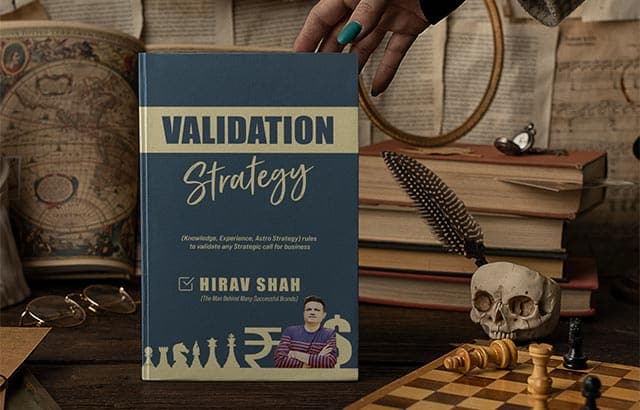Fear is a powerful emotion that can often cloud our judgment and lead us to make decisions that we later regret. When we make decisions based on fear, we may miss out on valuable opportunities for growth and success. In this guide, we will explore the impact of fear on decision-making and provide strategies to overcome fear and make confident choices.
It is in your moments of decision that your destiny is shaped. Just make sure, your decision-making comes from a place of high energy & not from fear.
Decision Making Needs To Come From A Place Of High Energy.
Making decisions is a great part of who we are. They define and shape us. For matters of great importance we tend to analyze and ponder, weigh pros and cons, make lists and after some time, come up with a decision we are more confident to be the right one.
But, more importantly, the decision making should always come from a place of high energy and not from a place of fear…Opines Hirav Shah, Topmost Influencer & Advisor in the Business World.
On that note, Hirav Shah Outlines- How To Ensure “Effective Decision Making”- That Comes From A Place Of High Energy.
Table of Contents
1. Trust Your Instincts
Trust your instincts, and make judgments on what your heart tells you. The heart will not betray you.
2. Prioritize Key Factors
Effective Decision making requires assessing many factors, including the quality of data you have access to, the impact that the decision will have on your life, the experience you have with similar decisions, options available and the cost of delay. A good decision maker balances the factors in real-time, putting more attention on those that are time-sensitive, complex and impactful.
3.Make Your Vision Clear
Know where you want to go. If you do not know where you want to be, you cannot map out a path to get you there.
However, if you already knew where you were headed, the decision may be easier. Decision-making is not one giant leap; it is small steps along the way to your final destination. The closer you get to that, the easier it is to see what is blocking your path.
4. Stumbling, Be OK With It
Our best teachings often come from when we make decisions that do not stick. They teach us lessons. If you do not get the results you are looking for, you do not stop — you use those lessons to keep seeking the results you want. If you stumble a bit, it will make you stronger and wiser.
5.Keep Moving
This is all about taking decisive action. If you just stand there looking at the fork in the road, you will never move closer to your destiny. Do not be afraid.
If you are committed to your vision, know what options you have. It’s ok if you have to pivot and adjust, and you just keep moving, you will find your way on the road that was meant for you.
All roads lead to something. The choice is yours…Tells Hirav Shah, Famed Thought Leader, Business Guru & Astro-Strategist.
At WorkPlace
Fear is a powerful emotion that can cloud our judgment and lead us down the wrong path, especially in the workplace. When we make decisions based on fear, we often prioritize short-term safety over long-term success. This can manifest in various ways, such as avoiding challenging projects or difficult conversations, sticking to the status quo, or refusing to take calculated risks.
In the workplace, decisions driven by fear can stifle innovation, hinder personal and professional growth, and ultimately harm both individual and organizational progress. Instead of making informed, strategic choices, we become reactive, making knee-jerk decisions to alleviate our immediate anxieties.
To make effective decisions in the workplace, it’s essential to acknowledge and manage fear. It’s natural to experience fear in certain situations, but it should not dictate our actions. Instead, we should strive to make decisions based on rational analysis, a clear understanding of our goals, and a commitment to long-term success. By doing so, we can navigate challenges, embrace opportunities, and build a more resilient and successful professional environment.
Final Thoughts
When decisions are driven by fear, they often result in unfavorable consequences and missed chances for growth. This informative guide offers valuable insights on how to conquer fear and make decisions with confidence.
Fear-Based Decision Making: Consequences and Missed Opportunities for Growth
1.Fear clouds judgment
When we make decisions based on fear, our judgment becomes clouded. Fear triggers our fight or flight response, causing us to react impulsively rather than thinking rationally. This can lead to poor decision-making and regret later on.
2. Fear limits possibilities
Making decisions out of fear often leads to playing it safe and sticking with what is familiar. However, this can prevent us from exploring new opportunities and experiencing personal growth. By letting fear dictate our decisions, we limit our potential and miss out on exciting possibilities.
3. Fear breeds negativity
Fear is a negative emotion that can spread like wildfire. When we make decisions based on fear, we are more likely to create a negative atmosphere around us. This negativity can affect our relationships, work, and overall well-being. It is important to make decisions from a place of positivity and confidence.
4. Fear hinders personal development
Making decisions based on fear can hold us back from reaching our full potential. It prevents us from taking risks and stepping outside of our comfort zones. Growth and personal development often require us to face our fears and make decisions that may initially seem daunting.
5. Fear leads to missed opportunities
When we let fear guide our decisions, we may miss out on valuable opportunities. Fear can make us hesitant and indecisive, causing us to pass up chances for personal or professional advancement. It is important to recognize when fear is influencing our decision-making and challenge ourselves to take calculated risks.
6. Fear creates a cycle of regret
Decisions made out of fear often lead to regret. We may look back and realize that we let fear hold us back from pursuing our dreams or making choices that aligned with our values. Breaking free from this cycle requires acknowledging our fears and making decisions based on what truly matters to us.
7. Overcoming fear leads to empowerment
When we make decisions based on courage and confidence rather than fear, we empower ourselves. Overcoming fear allows us to grow, learn, and become more resilient. By making decisions from a place of strength, we can create a life that aligns with our true desires and values.
In conclusion, making decisions based on fear is usually the wrong decision. It limits our potential, breeds negativity, and hinders personal growth. By recognizing and overcoming our fears, we can make decisions that lead to empowerment and a more fulfilling life.
Overcoming Fear: Making Decisions with Confidence
1. Identify the fear
The first step in overcoming a decision made from fear is to identify the fear itself. Take a moment to reflect on what is causing the fear and how it is influencing your decision-making process. Is it a fear of failure, rejection, or uncertainty? Understanding the root cause of the fear will help you address it head-on.
2. Challenge your assumptions
Fear often stems from assumptions and beliefs that may not be based on reality. Take a step back and question the validity of your fears. Are they grounded in facts or are they based on irrational thoughts? By challenging your assumptions, you can gain a clearer perspective and make more rational decisions.
3. Seek support and advice
When making decisions based on fear, it can be helpful to seek support and advice from trusted friends, family, or mentors. They can provide an outside perspective and help you see things from a different angle. Their guidance and encouragement can give you the confidence to make decisions based on logic and reason rather than fear.
4. Consider the long-term consequences
When fear is driving your decision-making process, it’s important to consider the long-term consequences of your choices. Ask yourself if the decision made out of fear will truly benefit you in the long run or if it will hinder your growth and progress. By focusing on the bigger picture, you can make decisions that align with your goals and values.
5. Take calculated risks
Overcoming fear often requires taking calculated risks. Instead of letting fear hold you back, embrace the opportunity for growth and learning. Evaluate the potential risks and rewards of your decision and weigh them against each other. Taking calculated risks can lead to personal and professional growth, and help you overcome the negative impact of fear on decision-making.
Perhaps our greatest distinction as a species is our capacity, unique among animals, to make counter-evolutionary choices.
But, you can’t make productive decisions based on fear and the possibility of what might happen, Hirav Shah Concludes…



































